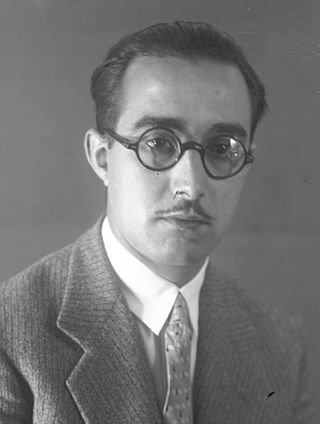
Florida Street is a popular shopping street in Downtown Buenos Aires, Argentina. A pedestrian street since 1971, some stretches have been pedestrianized since 1913.

Avenida Corrientes is one of the principal thoroughfares of the Argentine capital of Buenos Aires. Over a central stretch it is popularly known as "The Street that Never Sleeps" widely considered Buenos Aires' answer to Broadway as it concentrates many of the main theatres and cinemas as well as famous pizzerias and cafes, being intimately tied to the tango and the porteño sense of identity. Like the parallel avenues Santa Fe, Córdoba, and San Juan, it takes its name from one of the Provinces of Argentina.

Román Viñoly Barreto was a Uruguayan-Argentine film director notable for his work during the classical era of Argentine cinema.

Julio Irigoyen was an Argentine film director notable for his work during the Golden Age of Argentine cinema.

Luis Bayón Herrera was a Spanish film director and screenwriter who worked in Argentine film of the 1940s and 1950s. He was "one of the most important directors of the Golden Age of Argentine cinema".

José A(gustín) Ferreyra, popularly known as "Negro Ferreyra", was an early Argentine film director, screenwriter and film producer. He was also sometimes credited as production designer.

Carlos Schlieper was an Argentine film director and screenwriter notable for his work during the classical era of Argentine cinema.

Enrique Carreras was a Peruvian-born Argentine film director, screenwriter and film producer. He was one of the most prolific film directors in the history of the cinema of Argentina and a prominent figure of the classical era of Argentine cinema.
The Girl from Florida Street is a 1922 Argentine silent film directed and written by José A. Ferreyra.
A Woman from the Street is a 1939 Argentine drama film written and directed by Luis Moglia Barth during the Golden Age of Argentine cinema. The film premiered on August 23, 1939, in Buenos Aires and starred Aida Alberti.

The Model and the Star is a 1939 Argentine comedy film directed by Manuel Romero during the Golden Age of Argentine cinema. The film premiered on March 15, 1939 in Buenos Aires and starred Alita Román.
El Hijo de la calle is a 1949 Argentine film.
The Street Next to the Moon is a 1951 Argentine romantic drama film directed by Román Viñoly Barreto.

Lucas Demare was an Argentine film director, screenwriter, and film producer notable for his work during the classical era of Argentine cinema and beyond.

Wilde is a city in the Avellaneda Partido, Buenos Aires Province, Argentina. Wilde is the most populous district in Avellaneda, with a total of 65,881 inhabitants. It is a part of the Greater Buenos Aires urban agglomeration.

Ángel Magaña was an Argentine film actor of the Golden Age of Argentine cinema during the 1930s, 1940s and 1950s.
Mariano Argento is an Argentine television actor who has primarily appeared on Argentine television. He has appeared in over 15 Argentine television series and films since 1994.

Diego Olivera, is an Argentine actor.
Ernesto Arancibia was an Argentine film director and screenwriter, notable for his work during the classical era of Argentine cinema.
Aurelia Ferrer was an Argentine film actress. She appeared in around forty films, generally in supporting roles.
This page is based on this
Wikipedia article Text is available under the
CC BY-SA 4.0 license; additional terms may apply.
Images, videos and audio are available under their respective licenses.











